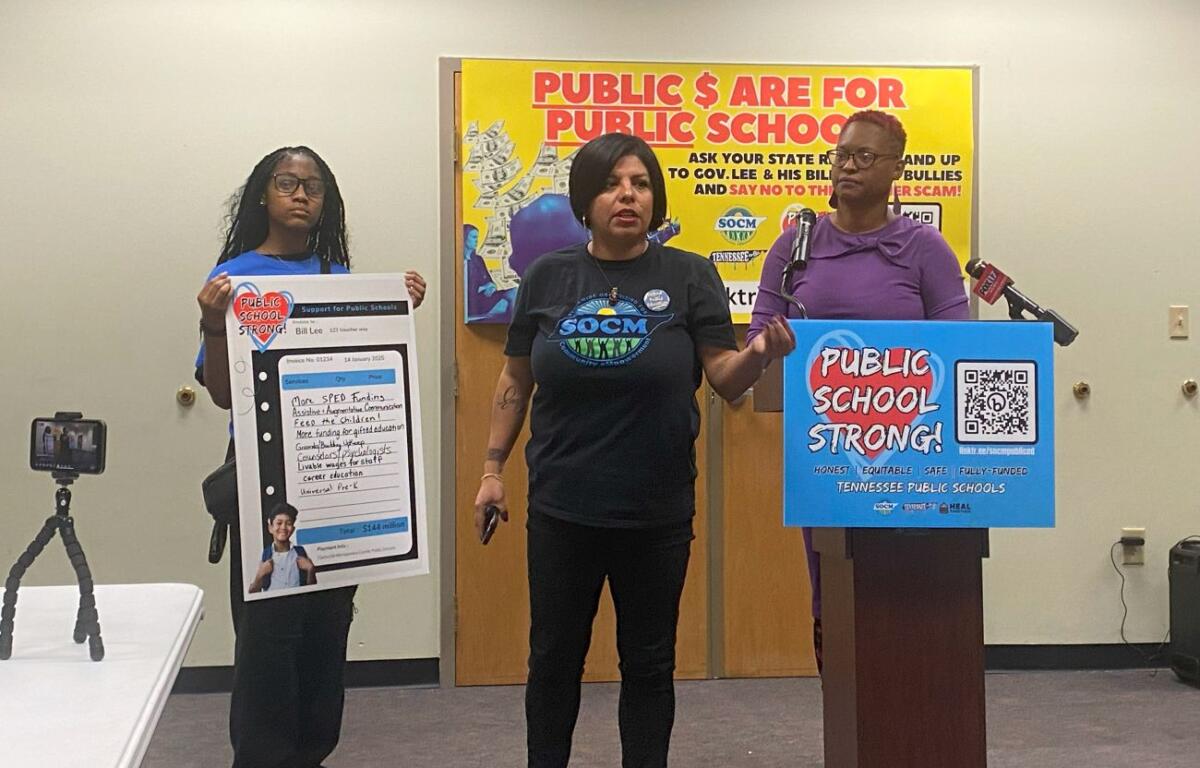CLARKSVILLE, TN (CLARKSVILLE NOW) – A group opposed to a move to expand school vouchers in Tennessee hosted a news conference Tuesday urging local and state leaders to reject the measure, which would fund private schools with taxpayer dollars.
Among those in attendance at the Public School Strong event at the Clarksville-Montgomery County Public Library were CMCSS School Board members Carol Berry and Jimmie Garland, both speaking against the vouchers.
Wednesday morning, Gov. Bill Lee announced he will call a special session on Jan. 27 to pass his “Education Freedom Act,” which would expand school voucher programs statewide. The legislation would use state tax dollars to provide 20,000 scholarships of $7,000 each to students to pay for private school tuition.
The Statewide Organizing for Community Empowerment (SOCM) launched the Public School Strong TN campaign to combat this bill.
Funding private schools
SOCM’s Rosa Ponce said the scholarship cannot cover the full cost of private school tuition, so it would only benefit families who can already afford private schooling, making the bill a discount for the wealthy. Meanwhile, the money that would have gone to the public school system would be siphoned toward private schools.
Ponce said the legislation includes “concessions” such as a $2,ooo bonus for K-12 teachers, hurricane relief, and sports betting money for school infrastructure. She expressed outrage at the decision to attach these programs to the legislation as a strategy to get it passed, and said they were essentially bribes.
President of the Clarksville-Montgomery County Education Association Stephanie Outlaw said the bill would be a handout to special interests, a subsidy for the rich, and is being pushed by lobbyists and out-of-state billionaires. She also said the bill would inevitably create a higher budget which would increase property taxes in the county.
Impacts of school vouchers
John Patrick of the Cheatham County School Board spoke about an op-ed by a co-sponsor of the bill, Rep. Mark White in which White claimed that voucher programs like Arizona’s Universal Empowerment Scholarship weren’t detrimental because in 2024 that state’s schools budget increased by $4.3 million. He left out that Arizona saved $16.8 million by repealing the UES along with other financial adjustments. In fact, according to their budget, the state had to make cuts to water infrastructure due to the debt they incurred last year.
Patrick said, “The op-eds they put out have a little bit of truth, and a whole lot of something else.” White’s op-ed referenced a study that said private schools save money, but Patrick said this study was done by EdChoice, a pro-voucher organization.
Church and state
The bill also raises questions of separation of church and state, opponents said. SOCM member Geneva Cleffton said, “The Constitution says separation of church and state, and state tax dollars shouldn’t go to (private schools). We should fully fund the schools we have.”
CMCSS School Board member Carol Berry said, “Vouchers are a violation of the First Amendment, the separation of church and state. I love God, but we should not use our citizen’s money to fund private schools.” Berry said as that what’s best for students is what’s best for public schools, and that she’ll never vote for school vouchers, or to use taxpayer dollars to fund private education. Berry also said the state keeps reintroducing the same bills from different directions regardless of how many times the people reject it.
Segregation issues
CMCSS chair member Jimmie Garland said, “The only children who can attend those public schools will be the children of parents who can already afford to send their children there today, but those making $7.25 an hour will still have to pay taxes to send those children to school. Meanwhile, the children who would most benefit from this funding will never be allowed in those schools.”
Stephanie Outlaw said the bill explicitly doesn’t hold private schools to the same standards as public schools and it doesn’t require these private schools to accommodate disabled students. Meanwhile, public schools are required to provide affordable options and resources to help students with disabilities.
Community organizer Monica Meeks said the bill is an attempt to resegregate schools because private schools can deny whomever they want.
What’s next
SOCM plans to attend the CMCSS School Board meeting on Tuesday, Jan. 21, at 6 p.m.
For more information about SOCM and Public School Strong TN, go to www.socm.org/publiceducation.














